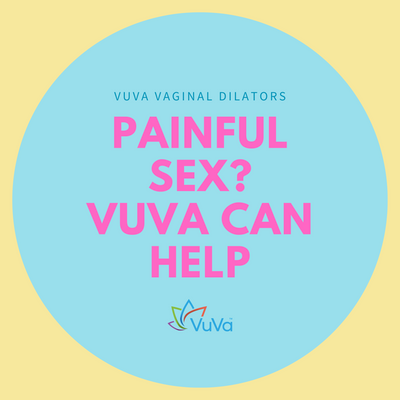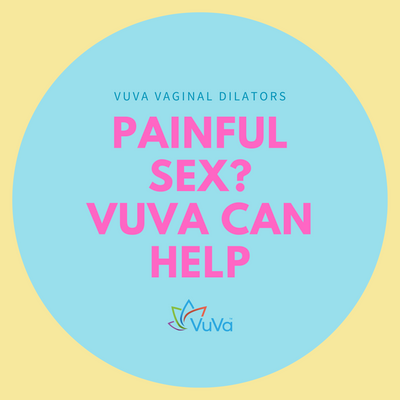
| Tara Langdale
Do Dilators Really Work? Yes, and They can Improve Your Sex Life!
Finding a solution is life-changing
Vaginal dilator therapy is by far the most common treatments for painful penetration. Physical therapists and doctors recommend using vaginal dilators to improve sexual health and ease pain and discomfort. But some question whether dilators work? This article will discuss what dilators are, what they treat, and how well they work.
What are dilators?
Vaginal dilators are tube-shaped devices designed to help relax and lengthen a vagina, restore vaginal capacity, and allow for more comfortable sexual activity. Sometimes men and women confuse them with vibrators or dildos, but dilators are not a sex toy. Dilator therapy is commonly prescribed to help heal pelvic pain in women’s health.
Dilators come in different sizes and materials. Traditional dilators are made from medical grade polycarbonate plastic, glass, or silicone rubber that’s smooth. Higher quality dilators such VuVa™ use Neodymium magnets inside the entire dilator to increase blood flow to the painful area to calm the nerves and relax muscles.
Dilators come in a variety of graduated sizes and weights. The smallest being about the size of a small tampon and the largest close to the size of a slender cucumber. The material is non-toxic, latex-free, and waterproof.
What do dilators treat?
People seek treatment with vaginal dilators for a variety of medical reasons. Dilators improve vaginal dilation, including helping with sexual pain during sexual intercourse, vaginal stenosis, vaginal atrophy, and to treat vaginismus. Some women who have breast cancer or lichen sclerosus and experience sexual pain and discomfort due to vaginal atrophy associated with these conditions can benefit from vaginal dilators as well.
Pain during sexual intercourse
Experiencing muscle tension and pain during sexual intercourse isn’t uncommon. The reasons for uncomfortable penetration include the following:
- Tearing or lesions inside the vagina
- Menopause (Vaginal Atrophy)
- Fear of Penetration due to Sexual Trauma
- Pelvic inflammatory disease or infection
- Vulvodynia (undiagnosed condition for the pain)
- Pelvic radiation therapy
- Vaginal stenosis
- Vaginismus
Vaginal stenosis
When the vagina or birth canal becomes shorter and narrow, it may be vaginal stenosis. Also, the tissue of the vagina may be drier, thinner, and contain scarring. This can result in severe pain during sexual intercourse or a pap smear. One reason for vaginal stenosis is radiation therapy to the pelvis or having some types of surgery.
Vaginal atrophy
Dryness or vaginal atrophy is a lack of lubrication in the vagina. For most women, this indicates a lack of desire, but for some, the condition connects to a deeper health issue. Vaginal atrophy is a menopausal symptom and occurs due to an imbalance of the sex hormones estrogen and progesterone.
According to the Memorial Sloan Kettering Cancer Center, vaginal atrophy can happen sooner than menopause when a woman has had cancer treatments like pelvic radiation, or surgery to decrease the risk of cancer.
Vaginismus
Despite a women's desire for sexual intimacy, her vaginal muscles tighten involuntarily. Often vaginismus begins during a women's first attempt to have sexual intercourse. Although sexual dysfunction can develop later, making the condition even more confusing. The cause could be emotional distress, leading to a fear of having sex.
The fear causes muscles to become even tighter, resulting in pain. It becomes that even when the woman is simply rubbed or touched, the muscles constrict automatically. Most women end up not being able to tolerate penetration or any sexual activity. Even inserting a tampon, or having a pelvic floor physical brings out intense stress and pain. When you’re diagnosed with vaginismus, using a vaginal dilator can help.
Do dilators really work?
Having a healthy sex life is essential for most women. When you have fear or extreme pain during any kind of penetration, using a dilator is often prescribed in female sexual medicine. Research scientists have shown that vaginal dilators improve sexual intimacy by lengthening and stretching the vagina naturally.
 Vuva Dilator Company - Dilators starting at $28.00
Vuva Dilator Company - Dilators starting at $28.00
Dilators slowly widen your vagina on your terms. Since vaginal dilators come in different shapes and sizes, you can choose the size right for you. Also, women use vaginal trainers in the privacy of their own home, while not engaging in sexual activity, making the experience focused solely on their needs by going at the pace of treatment they're comfortable with.
Women can undergo vaginal dilator therapy as long as they need to. While some may want to the pain to ease after one or two uses, it can take a few months or longer for dilator therapy to work thoroughly and make the vagina more elastic.
Vaginal dilator therapy does really work and helps the following emotional and medical concerns:
- Ease the discomfort associated with a full pelvic exam, including your vulva and internal reproductive organs
- Make pelvic exams easier
- Lessen pain with sexual activity
- Helps women overcome the fear of intimacy
- Eases painful vaginal symptoms caused by pelvic radiation
For the past 50 years, vaginal dilators have been prescribed by doctors and health care experts. Some view it as a form of physical therapy and necessary in sexual medicine to help women have a pain-free sex life they enjoy. So to answer the question, do dilators really work? Yes, they not only do work, but they improve women’s lives.
What are the signs and symptoms you need a dilator?
Making the decision to use a vaginal dilator may not be easy for some women. It's not only the idea of inserting something up their vagina but also having to overcome the physical and emotional barriers connected to having a tight vagina. But when you're experiencing any of the following conditions, seeking treatment helps you have the life you deserve.
Speak to your health care provider about vaginal dilators if you have any of the following signs and symptoms:
- Dyspareunia (Painful sex)
- Vaginal atrophy due to menopause or cancer treatments
- Tight vagina after having pelvic radiation therapy
- Extreme pain and fear during a pelvic exam
How do dilators work?
Using a dilator is easier than you think. Dilators help release and stretch the pelvic floor muscles. When you're first beginning dilator therapy, choose the smallest dilator size. You can also go up in size, but if you start with one too big, the pain might cause you to stop for good.
Step One
You want to insert the VuVa™ Vaginal Dilator in the privacy of your own home. While you can work with a partner, it's recommended that you find a quiet space alone, where you won't be interrupted. Sexual medicine is a personal experience, and you want privacy for it to work the best.
Step Two
Generously lubricate the vaginal dilator and vaginal opening. It's essential you don't use a petroleum jelly like Vaseline, but rather a water-based lubricant. In a comfortable place like in your bed, lie on your back or in a fetal position. At this point, bend both knees and spread your legs apart. Remember to relax your body by taking deep breaths. Gently insert the smaller round end of the dilator into your vagina with a small amount of pressure. It's important you only insert the dilator shaft as deeply as you are comfortable with into the pelvic wall and leave the round flat end outside of the vaginal opening.
Step Three
Once the VuVa™ Vaginal Dilator is inserted, you'll want to leave it in for 20-30 minutes. It's vital that you leave it in place for as long as possible. At first, your muscles may involuntarily contract and try to push out the dilator, but over time, as you learn to relax, you can keep the dilator in longer.
Step Four
After therapy is complete, wash the dilator with soapy water and let air dry. Afterward, store in a safe place.
Additional TipsThe Memorial Sloan Kettering Cancer Center recommends that you increase the size of your dilators slowly. When you can insert one without discomfort, you're ready to move up to the next size. Also, it may take weeks or months before you're prepared to increase the dilator size.
In the beginning, Sloan Kettering also mentions that you may experience some slight bleeding after inserting the vaginal dilator. Light bleeding is normal, but if it’s heavy or continues longer than a day, consult with your doctor. You may want to wear a light panty liner to catch any spotting.
Can dilators be used during sex?
It isn't recommended to use dilators during sexual activity. Vaginal dilators are therapy devices to help improve female sexuality and stretch and lengthen a tight vagina, not used for sexual pleasure. Although therapy will help enhance sexual intercourse over time.
How often should I use dilators?
Getting used to dilator therapy can take some time. This is why health care professionals recommend using your dilator 1-2 times per day, for about 20-30 minutes per session. Women progress at different rates, depending on their condition. But if you undergo therapy a few times per day, progress is faster and more helpful.
What are the best dilators to use?
Vaginal dilators come in different lengths, widths, and styles. You can purchase VuVa Smooth Vaginal Dilator made from medical grade polycarbonate plastic with graduated tops to make insertion easier. This kind of dilator is non-magnetic but still extremely helpful
Other dilator options include Neodymium Magnetic Vaginal Dilators with magnets. In a small double-blind placebo clinical trial conducted by Sarasota Memorial Hospital IRB, showed that dilators with magnets were more effective than non-magnetic dilators.
Dilator magnet therapy is based on the principle that magnets draw fresh oxygenated blood to the nerves and surrounding muscles in the pelvis area to relax and stretch the vagina. Magnets also balance any acidity in the body caused by disease and new blood helps remove the imbalance, resulting in accelerated healing while easing the pain. While magnet dilators are a more significant investment than a more traditional dilator, the health outcomes may be better.
Vaginal dilators are a simple and effective therapy for women experiencing pain during sexual intercourse or have a tight vagina from cancer treatments or menopause. Or even for women with unexplained fear and tightness during sex. Sometimes the reason is personal and isn’t simple. Regardless, dilators do work and have helped many women have healthy sexual relationships and lessened pain during pelvic exams. Before using a vaginal dilator, consult with your healthcare professional.
Check out our magnetic dilator sets here
Here's a review from just one of thousands of satisfied customers: 
Other VuVa Helpful Links:
7 Reasons for a Tight Vagina and How to Loosen
How to Relax Vaginal Muscles, Vaginismus & Sex
Vaginal Stretching - Keeping in Shape with Dilators
Do Dilators Really Work? Yes, and They can Improve Your Sex Life!
Shop for VuVa Vaginal Dilators














